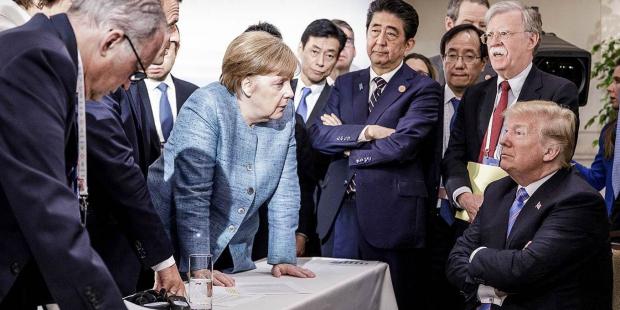The human incapacity to see what is coming also animates Sebastian Haffner’s memoir Defying Hitler, written in 1939, a year after he left his native Germany. Haffner, later a journalist and author, was a law student who witnessed how the Nazi dictatorship became lethal, again incrementally, like the persecution of Jews in Italy. He saw how his fellow law students, none of whom were Nazis, came to accept each step—racial laws, abrogation of the constitution, and so on—precisely because they were couched in legal terms. There never seemed to be a point at which they recognized that an intolerable line had been crossed and only resistance or exile would do. Haffner, who was not Jewish, did recognize it; he left in the year that synagogues were torched and Jews driven from their homes.
What was unimaginable only a few years ago—a US president insulting democratic allies and praising dictators, or calling the free press “enemies of the people,” or locking up refugees and taking away their children—has become almost normal now. When will it be too late to sound the alarm?
Under most circumstances, there are probably more Finzi-Continis than Haffners. It is hard to sleep well in a state of alarm. Life is easier if the world seems normal, even if it is anything but.
There are many ways people stick their heads in the sand, and some parallels between our own time and Europe in the early 1930s can be seen. Quite a number of German businessmen and industrialists, who were conservatives but not Nazis, thought they could live with Hitler, as long as he benefited them financially. He was a vulgar upstart, whose manners might not have been the finest, but surely they would be able to control him.1
Historical knowledge can help people to recognize certain patterns of behavior—attacks on an independent judiciary, for example—that have led to tyranny in the past. But historical memory, often blended with myth, can also stop people from reading the signs of what might come. In countries with a democratic history, it is easy to assume that “it could never happen here,” because “our institutions are too strong,” or “our people love freedom too much,” or they are “too civilized” or “too modern” to slide into barbarism.
Leftists can be just as blinkered as conservatives. Communists (instructed by Stalin), but also the non-Communist left in 1920s Germany, refused to defend the fragile Weimar Republic when it was under assault from the right. Communists saw social democrats as a greater danger than Nazis; and leftwing intellectuals were distracted by the hypocrisy and corruption of mainstream parties they really should have supported.
Donald Trump may not be a reincarnated Hitler, but Republicans’ acquiescence in every step he has taken away from civilized democratic norms is ominous. And so is talk on the far left that the difference between Trump and Clinton or Obama is one of degree, not kind: he merely displays the iniquities of neoliberalism more blatantly than they did. In both cases, the particular dangers posed by today’s right-wing populism are underrated or ignored.
The much-maligned mainstream press—those “enemies of the people”—is still robust. But its influence is waning. What appears in The New York Times or the Washington Post matters less than presidential tweets that go straight to millions of people and are echoed in partisan radio or TV shows.
In a polarized society, politicians who stir up the mob by exploiting fear and resentment are probably more likely to be successful than less exciting figures who try to appeal to our more rational faculties. Political parties that oppose the anti-liberal trends are in a serious bind. If they respond to youthful anger and idealism and move too far to the left, they could lose essential votes in the center. If they choose centrist candidates, who look for reforms rather than radical change, they might lose the fired-up young.
And yet freedoms must be defended, which is possible only when the threats are seen clearly. The moment people stop believing that the demagogues can be prevented from doing their worst is the moment we can be sure that it is already too late.
Ian Buruma, editor of the New York Review of Books, is the author of numerous books, including Murder in Amsterdam: The Death of Theo Van Gogh and the Limits of Tolerance, Year Zero: A History of 1945, and, most recently, A Tokyo Romance.

